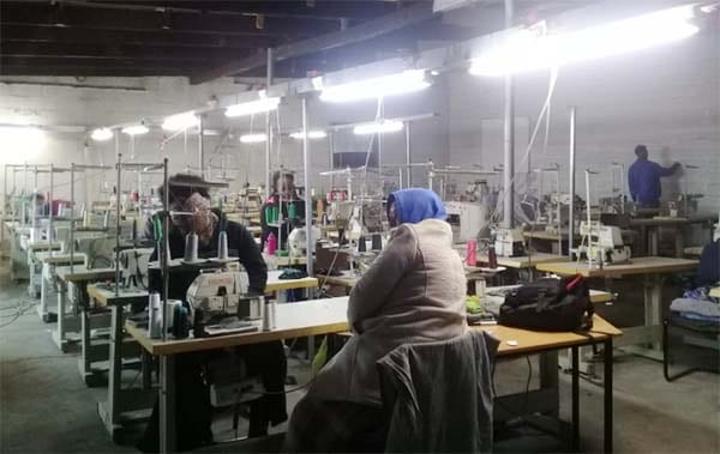Africa-Press – Lesotho. Owing to the skyrocketing rate of unemployment in Lesotho, working at local textile factories is one of the few available means of getting jobs for both the educated and the less educated people.
But the lack of essential skills exacerbates the situation and drives most job seekers, especially the youths to engage in activities that later prove to be detrimental to their lives.
Often, a large number of uneducated and unskilled job seekers at the textile firms are from the rural areas where they normally leave their humble homes with nothing in hand and come to the city to temporarily squat with friends while queuing at the factories for employment.
But because jobs are hard to come by even at the factories, their hopes get shattered when they are forced to wait in vain at the firms’ gates. After failing to secure the much-needed jobs, they eventually get thrown out of their friends’ rented apartments for failing to assist in footing the bills in the house.
The prospects of facing the streets without anywhere else to turn to lands most in the lion’s den of surviving by any means necessary where they end up not hesitating to compromise both their morals and integrity.
For some women, taking up jobs as domestic workers seems the only option while others, instead, resort to selling their bodies on the streets to any male customer with the cash to spare.
But the plight of their male counterparts remains a mystery though they are equally affected by this sorry state of affairs. Kalaele Mofoka, in his late 30s from Ha Mofoka, Maseru is one of hundreds of young men who left their rural homes and came to the city seeking jobs.
Mofoka resides in Lithabaneng with a family member from where he daily joins queues for a job with hundreds of other young men like him at the factories.
Every day, he walks from Lithabaneng at the crack of dawn to the Thetsane factories and he has been doing this for the past 14 months without success.
Early last year, he was temporarily employed at Precious Garment as a packer but the job only lasted for three months. “Now I am back where I started because there is no job or any hope of getting employed but I have to be here every day if I hope to ever get a job.
“People queue for years to get hired in these factories; if I want a job here, I should come every working day because some day I still hope to be lucky,” the young man says but his teary eyes reflect very little hope.
Mofoka says for one get a job in the factories, skills are quite handy but one cannot develop the sought-after skills on their own without tutelage, which needs money.
Hard as it sounds but that appears to be his only alternative as returning home is not an option for him. “I have responsibilities but coming here every day is the hardest thing to do. What is worrisome is that I have to walk here and back every day, but nothing seems to work for me at the end of the day.
“I spend the whole day here with anything to eat; what hurts the most is to see these Chinese traders coming out of the courtyard to only pick people among us with sewing or mechanical skills which I do not have.
“People like me without skills struggle to get jobs; we only have to wait for our luck to come through but that rarely happens,” he says.
Asked how he survives during the day without food, Mofoka says he relies on friends who share their packed lunch with him. “Even that cannot happen every day because they also struggle to make ends meet.
” Sometimes he earns some cash for lunch by collecting water for hawkers and assist them to sell their wares for a little fee.
Another person who has been queuing for ages for a textile factory job is ’Mahlompho Ranotsi, 43, who is now attending a skills development centre where she is learning how to sew.
Smart Enterprise – is a Chinese-owned centre established in 2013 operating both the Maseru and the Northern Skills Development Centres. The enterprise is run by a Chinese concessionaire whose mandate is to train unskilled Basotho to get employment in the textile industry.
Ranotsi says she has worked for 18 years in the packing department in the factories but was forced to quit for personal reasons. Later when she returned, she was told there was no space for her and only people with certain skills were required which is why she enrolled at the training centre.
“I never thought I would ever need to know how to sew; I was comfortable as a packer but now that I am developing myself, I am confident that I will get re-employed.
“I did not enroll at the centre because I have money but because I realised the importance of developing my skills for a better job.
I know that this little investment I am making now will pay off later,” she says. In spite of the challenges she faces every day, she is determined to soldier on in pursuit of her goals.
She noted that there are challenges now and then but her determination to get the skills motivates her to push even harder. Masemose Mokoro, a teacher at the skill development centre, noted that she teaches some sewing skills to people from different backgrounds with different educational levels.
“Studying at my age is not easy at all so I have to work harder if I want to succeed.
I have seen the results of the centre and I want to be just like people who graduated here,” she says, adding some of the graduates actually get employment in South Africa.
Fang Lu, the owner of Smart Enterprise, says the centre is profitable to the textile industry because before its establishment, the industries only employed unskilled workers who needed immediate training afterwards.
Since the centre became operational, the factories are able to help skilled labour and the production rate has also increased. Since its inception six years ago, the centre has trained a total of 7 200 Basotho who have since been employed in the textile industry.
Lu says the government, through the ministry of Trade and Industry, has since partnered with his company for better results. “In the past, Smart Enterprise used to get funding from government and the services were offered free of charge, but now the funding has stopped, so to generate its own income, the centre charges M200 per student,” he says.
He says they also train aspiring Basotho entrepreneurs, adding they have since helped develop two Basotho-owned textile businesses which are a great success.
To bridge the gap between unemployment, where men and women are concerned, the centre has ventured into a new skills project in which more men will be accommodated.
It trains Basotho companies and individuals to maintain both company and private vehicles. It also trains motorists on basic automotive skills, which include but is not limited to changing of batteries, tyres, panel beating and car washing.
“Although we have trained several people here, most of them do not finish their studies here because of financial problems or time constraints.
” He says most leave before the training ends to go and find employment.
“Getting employment at the textile industry is not easy for a person without skills.
Therefore, ensuring that Basotho get the skills that will enable them to be employed in the textile industries or any other industry is our main concern,” he says.
Even graduates from centres of higher learning in Lesotho like universities and colleges enroll at the centre to develop their skills so that they would be employed in the textile industry.
Principal Secretary of the ministry of trade and industry Soaile Mochaba confirms that in the past, government funded the Skill Development Centres in Maseru and Maputsoe to train unskilled Basotho for employment in the textile industry.
Mochaba says the government, however, met some challenges that forced it to stop the funding. “The government is, however, currently working on the issue and soon the unskilled Basotho will be trained under the government funding,” he says.
Lesotho’s garment and textile industry which employs more than 40 000 people is the second biggest employer in the country and one of the biggest garment producers in Africa.
In 2010 exports in the industry were valued at around 476 million USD. The industry is the largest private sector employer in the country and its exports constituted 20 percent of the national Gross Domestic Product (GDP) in 2015
For More News And Analysis About Lesotho Follow Africa-Press






